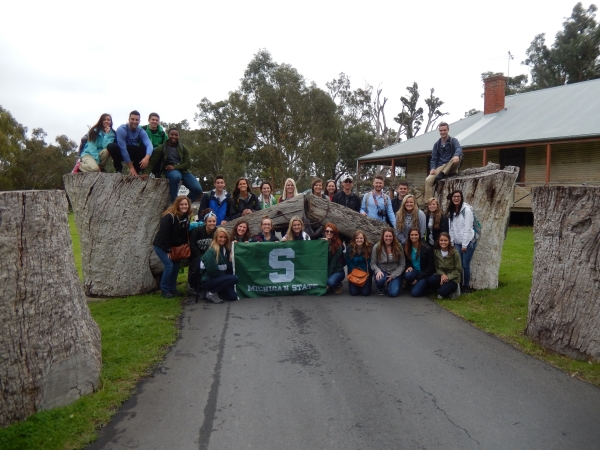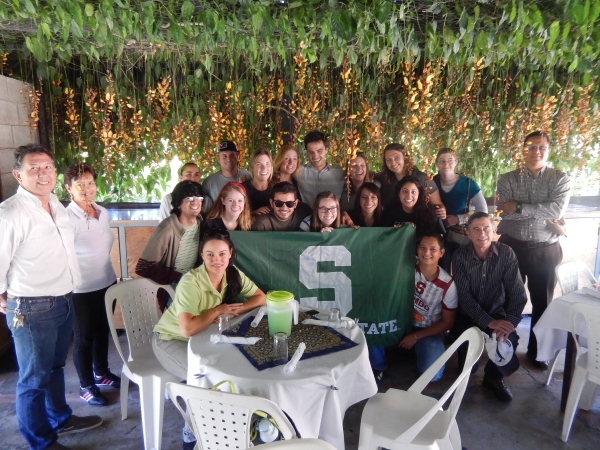Study Abroad
Why Should Students Study Abroad? (.pdf) by Luke Reese and Ajit Srivastava
Sustainable Food, Environment and Social Systems in Australia
Offered odd years.
Summer: TBD
https://osa.isp.msu.edu/Programs/program/index/108718
Review the 2017 blog.

Captivating, breathtaking, dynamic and even harsh extremes – the land “down under” has sparked the imagination of explorers and adventurers for centuries. Now, you can experience the excitement and wonder of Australia through a four-week education abroad program.
The program runs from approximately mid-July through mid-August, featuring an interdisciplinary exploration of sustainable social, food/agriculture, and environment systems. Special emphasis is placed on studying how humans interact with their built and natural environments in sustainable ways. Site visits include farms, agribusinesses, wildlife sanctuaries, national parks, museums and selected cultural and historical sites. Site visits are selected to stimulate critical thinking about and analysis of global citizenship in relation to policy, social equality, economics and environmental stewardship, etc.
Students also have the opportunity to work with international professionals and peers in a hand-on experiential learning environment. Example site visits exploring sustainability include:
- Sydney Olympic Park (a major recovered brownfield),
- the Adelaide Desalinization project (providing 50% of Adelaide's future potable water),
- the Great Barrier Reef,
- the wet tropics rainforest,
- Magenetic Island National Park, and
- a 55,000 acre working outback cattle property.
Multiple accommodation and transportation options are utilized to expose students to travel and cultural diversity. At the conclusion of the program, many students choose to travel to other parts of Australia, New Zealand, or Hawaii on their journey home (at their own expense).
Undergraduates will be required to enroll in a minimum of seven (7) semester credits from the following courses. Graduate students will be required to enroll in four (4) semester credits.
- ANR 475 International Studies in Agri. and Nat. Res. 2 – 6 credits.
- BE 475 International Studies in Biosystems Engr. 1 – 6 credits.
- ISB 202 Appl. Envir. and Organismal Bio. 3 credits.
- ISS 310 People and Environment 4 credits.
- CSUS 419 International Studies in Comm. Sustainabilty 1 – 6 credits..
Students also will be required to attend six pre-departure orientations during Spring Semester 2019.
Course prerequisites may apply; see Course Descriptions (on the MSU Website) or program leader for details. A 2xx ISS course completion is required for enrollment in ISS 310.
Ecological Engineering in the Tropics Costa Rica
Offered even years.
Summer: TBD
https://osa.isp.msu.edu/Programs/program/index/107274
Review the 2017 blog.
 This winter-break program explores the design and performance of clean energy and water systems in the tropics. Traveling on the program will be Universidad de Costa Rica peer faculty and students. Ecological carbon, water and energy footprints for bananas, pineapple and coffee will be used to categorize and evaluate system designs for sustainable economic, environmental and social systems. Active-learning, hands-on labs/activities will help in the understanding of design, performance, installation and system evaluation in answering questions like:
This winter-break program explores the design and performance of clean energy and water systems in the tropics. Traveling on the program will be Universidad de Costa Rica peer faculty and students. Ecological carbon, water and energy footprints for bananas, pineapple and coffee will be used to categorize and evaluate system designs for sustainable economic, environmental and social systems. Active-learning, hands-on labs/activities will help in the understanding of design, performance, installation and system evaluation in answering questions like:
1. Is biomass energy production sustainable and viable in a topical environment where biomass is abundant?
2. What engineering principles and designs can be used to improve energy production while maintaining a carbon-neutral and clean water footprint?
3. What are the biomass, energy and water footprints for commodities grown primarily outside of the US for consumption in the US (e.g., bananas, pineapple and coffee)?
Program participants will visit cities, villages, University/research facilities, industries, non-profits, museums, national parks, agri-businesses, forests, plus select cultural and historical sites, as a means of considering these questions. Students will be exposed to situations that help foster their growth as global citizens and professionals.
Students will be required to enroll for six (4) credits from the following courses:
- BE 475 International Studies in Biosystems Engineering 4 credits
- BE 491 Special Topics in Biosystems Engineering 4 credits
- EGR 400 Special Problems in International Engineering 4 credits
- ANR 475 International Studies Agriculture and Natural Resources 4 credits



 Print
Print Email
Email